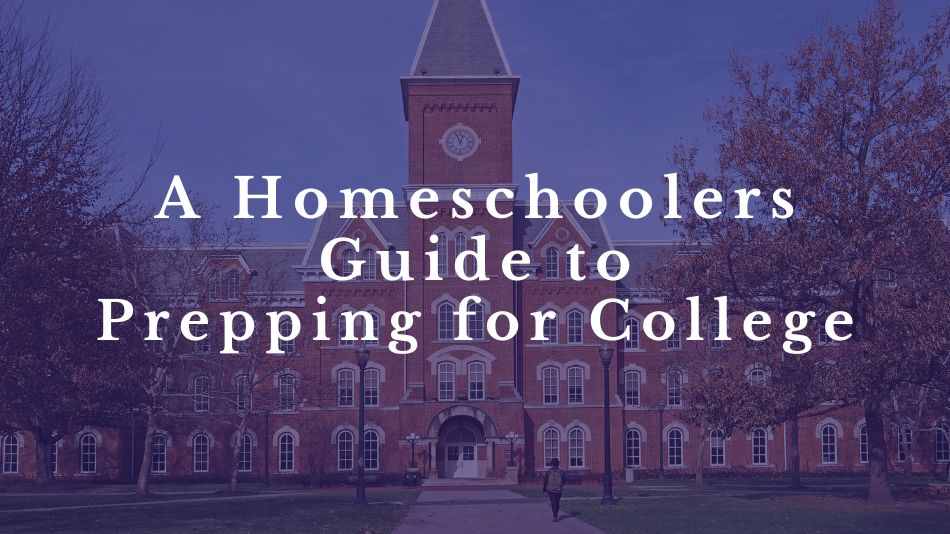
Preparing for college can feel like a big deal, especially when you’re homeschooling. You’re probably thinking, “Where do I even start?” Don’t worry, you’re not alone, and just like many before you, it will all come together in the end.
The truth is, getting ready for college as a homeschooler isn’t all that different from what students in traditional schools do. In fact, you’ve got some advantages that can make the process a bit easier than if you were in a traditional high school.
This guide will walk you through everything you need to know to get ready for college after homeschool. We’ll talk about taking the right classes, acing the standardized tests, exploring advanced options like AP exams, and even how to save some money with fee waivers. Whether you’re dreaming of a big university, a small liberal arts college, or something in between, this guide will give you a clear path forward.
By the end, you’ll know exactly what steps to take to make your college prep journey as smooth (and stress-free) as possible. So let’s dive in.
First up - taking the right homeschool classes for college admission
When it comes to getting into college, the classes you take in in high school during homeschool are going to make a big difference, and here is where a lot of homeschool families go wrong.
Colleges want to see that you’ve challenged yourself, built a solid academic foundation, and are ready to handle college-level work.
The good news?
As a homeschooler, you have the flexibility to create a curriculum that checks all the boxes WHILE still interesting you at the same time.
Here are the basics of what college admissions offices expect to see on your high school transcript:
- English/Language Arts: 4 years. Think classic literature, essay writing, creative writing, or even speech and debate. Strong communication skills are a must for college, so don’t skimp in this area.
- Math: 3-4 years. Most colleges want to see Algebra I & II, Geometry, and sometimes Pre-Calculus or Calculus. If math isn’t your thing, don’t panic. Focus on doing your best and showing steady improvement and consistency.
- Science: 3-4 years. Colleges love to see lab sciences like Biology, Chemistry, and Physics. Bonus points if you dive into electives like Environmental Science or Astronomy! Look in your local area for homeschool classes that offer labs. Not everyone is set up at home so do a little research.
- Social Studies: 3-4 years. History, Government, and Economics are the big ones here, but don’t be afraid to explore electives like Psychology or World Geography.
- Foreign Language: At least 2 years of the same language. Whether it’s Spanish, French, ASL, or even Latin, colleges will appreciate the effort to learn a new language.
And don’t forget about electives! Classes like art, computer science, or business can add some serious personality to your transcript. They’re a great way to show off your interests and make your application stand out.
Some great places to get a leg up in this area are: online courses (we cover a few of these in our working parent homeschool article), dual enrollment at a local community college, or even homeschool curriculum designed specifically for college prep.
Remember, your transcript tells your high school story. It shows colleges not just what you’ve learned, but who you are and what you are capable of. So find the classes that really interest you and compare them against the college admissions requirements.

Standardized college assessment testing for homeschool - SAT, PSAT, and ACT
Ah, standardized tests. No one wants to hear, or let alone think about testing, but these are the tests that ARE IMPORTANT if you are prepping for college.
But, the good news? You don’t need to stress!
Most colleges require either the SAT or the ACT. These tests help schools get an idea of your academic skills and readiness to take on college-level work. As a homeschooler, registering for these tests is straightforward. You just sign up like anyone else.
Let's go into a little more detail about each test below.
The SAT for homeschoolers - this one is the key to college
Homeschooled students register for the SAT just like everyone else—either online or on paper. When you’re asked to enter a high school code, homeschooled students need to use 970000.
We highly recommend prepping for the SAT long before it's time to take the test. One of the best places to do this is the Official SAT Practice on Khan Academy®. It's completely free, online, and offers personalized study plans based on past test results or quick quizzes. Plus, students who practice for just 6–8 hours tend to see their SAT scores go up by an average of 90 points!

PSAT/NMSQT, PSAT 10, and PSAT 8/9
The PSAT-related tests are great ways for students in grades 8–11 to practice for the SAT. These tests cover the same content as the SAT but are more age appropriate. A lot of homeschool families don't know this, but the PSAT/NMSQT is the test that qualifies students for the National Merit Scholarship Program. This program recognizes academically gifted students (including homeschool students), and offers scholarship awards based on the PSAT/NMSQT score.
Free money is good money!
To register for the PSAT, you'll have to get in touch with a local high school counselor. They can help get you all set up.
The ACT - an alternative college admissions test
The ACT is another popular standardized test, and some students prefer it over the SAT. The difference between the two is that the ACT includes a science section (so if you are interested in a science major, consider the ACT), and a longer writing section. Schools accept the SAT and ACT equally, but consider which test will be best for you by deciding what your future in education and career will be. If you are looking for some free online ACT practice tests, click this link to find plenty.
ACT and SAT fee waivers for homeschool
SAT fee waiver
For the SAT, you can get a fee waiver directly from the College Board fee waiver page. You'll have to register for an account. When you do, remember to use code AI 970000 with school name being Home School.
Alternatively, you can go to your local high school counselor and they can also help you get a fee waiver. Bring documents to support proof of eligibility (tight on money). Things like tax records or proof of enrollment in a financial aid program like Medicaid or SNAP will work.
ACT fee waiver
As of April 3, 2025, you can visit the ACT fee waiver page and register to take up to 4 ACT tests for FREE! You also get access to a bunch of other goodies there too when you register including: the self-paced course by Kaplan, an answer key to compare your test answers to the correct answers afterwards, and the ability to defer or waive college admissions fees.
Advanced Placement (AP) Exams for homeschool
Did you know you can start earning college credit while you’re still in your high school years of homeschool? One way is through dual-enrollment in a local community college, but the other is with Advanced Placement (AP) courses and exams.
AP classes deliver college-level material, which looks great on college applications and school transcripts. Plus, if you score well on the AP exam, you can save a little time and money by skip some of the intro-level college courses after you get to college. Let's talk more about AP.
How do AP courses work for homeschool?
As a homeschooler, you have a few options for taking AP courses (another benefit of homeschooling):
- Self-Study: You can study AP material on your own using textbooks, online resources, or AP prep books.
- Online AP Classes: Many online providers offer AP courses designed specifically for homeschoolers. Just make sure they’re approved by the College Board first so you are getting the credit.
- Local Schools: A lot of homeschool families don't know this, but you can enroll in your local high school for a class or two. In the case of AP, you can talk to the counselor at the school and they can fill you in on how it all works.
More about AP Exams for homeschoolers
Taking AP exams while you are in homeschool has its benefits. While the SAT and ACT tests are required to get into most colleges, the AP exams make you look great, give you college credit, and help you skip some classes in your first years of college.
Let's go over these in more detail:
Earn College Credit: Many colleges grant credit for AP scores of 3, 4, or 5, depending on their policy. That means you could save thousands of dollars in tuition!
Stand Out in College Admissions: Taking AP courses shows that you’re willing to challenge yourself and tackle tough material.
Skip Intro-Level Classes: Nobody wants to sit through College Algebra if they don’t have to. AP Exams can help you jump straight into more advanced courses.
Fee waivers for AP homeschool
College application fee waivers, FAFSA, and scholarships - oh my!
College application fee waivers
Getting off to college can be pricey if you don't play your cards right. This section is the one that will save you a ton of money. We already went over SAT and ACT fee waivers above, and we highly recommend taking advantage of these options if you are homeschooling. There are already enough costs. The good news is, if you received a SAT or ACT fee waiver, you are AUTOMATICALLY eligible for a college application waiver.
Good news right?
Here's how it work:
- When you apply to colleges, just indicate that you have a fee waiver. Many schools accept this directly through their application systems.
- Some schools may require additional documentation. You can usually get from the College Board or ACT.
Fee waivers are just the beginning. There are other ways to make college more affordable.
- FAFSA: The Free Application for Federal Student Aid (FAFSA) is your ticket to grants, loans, and work-study programs. Every student should fill it out, even if you’re not sure you’ll qualify for aid.
- Scholarships: From local community scholarships to national programs like the National Merit Scholarship Program, there are plenty of opportunities for homeschoolers to earn free money for college. Just do a Google search for "college scholarships" and you'll find days worth of information to comb through.

Building a solid homeschool transcript for college admissions
If there is one section of this article you need to be paying attention, it's this one!
As a homeschooler, you don’t have a guidance counselor creating your transcript. It's usually you or a parent. No problem. You can create your own homeschool transcript without much effort.
If you are not a BridgePath Connect member, consider joining. You'll get access to the Complete Guide to Homeschool Transcripts, which covers everything you need to know about transcripts in more detail AND you'll have direct access to us for any questions along the way.
From a fundamentals standpoint, here's what you need to make sure is included in your homeschool transcript before you hand it over to college admissions:
- Basic Information: At the top, list your full name, the name of your homeschool (if applicable), and your contact information. You can also include your homeschool’s address and a statement like “Homeschool Transcript.”
- Courses and Grades: For each year of high school, list the courses you’ve taken, the grades you earned, and the credits you received. Be sure to include core subjects (English, Math, Science, Social Studies) as well as electives.
- GPA: Calculate your Grade Point Average (GPA) for each year and overall. This shows colleges how well you’ve performed academically. There are plenty of online GPA calculators to help if you’re not sure how to do this.
- Credits Earned: Assign a credit value to each course (e.g., 1 credit for a full-year class, 0.5 credits for a semester class). Colleges expect to see this information on your transcript.
- Graduation Date: Include your expected graduation date. This is especially important for college applications.
Where homeschools go wrong
Records!
Year after year, subject after subject, homeschool families often fail to save grades, curriculum used, subjects taken, papers written, and other pertinent information required for transcripts.
If you are just getting started with homeschool in high school, make sure you save everything! Get an oversized binder for each year, save everything inside and put it in a safe place and ready for transcripts later on.
Your homeschool transcript tell the academic story, so take your time, get organized, and make it shine.
Mastering the college essay
Your college application essay is the easiest way to show college admissions officers who you really are and why you would be a great fit for that college or university. The essay gives you a chance to tell your story, share your passions, and let your personality shine. For homeschoolers, this is especially important because homeschoolers usually have an interesting story to tell unlike the run-of-the-mill traditional high school student.
The quick-guide to college essay writing for homeschoolers
1. Understand the prompt
Most colleges will give you a specific essay prompt or a set of prompts to choose from. Common prompts include:
- Reflecting on a personal challenge or achievement.
- Describing a topic, idea, or experience that’s deeply meaningful to you.
- Explaining why you’re interested in a specific college or field of study.
Take time to read the prompt carefully and make sure you understand what it’s asking. If you have multiple prompts to choose from, pick the one that resonates with you the most.
2. Brainstorm Your Story
Before you start writing, ask yourself:
- What experiences have shaped who I am?
- What am I passionate about?
- What challenges have I overcome, and what did I learn from them?
- How has homeschooling influenced my educational journey?
Remember, your essay doesn’t have to be about something dramatic or life-changing. Some of the best essays focus on small, personal moments that reveal something important about the you, the applicant.
3. Be Authentic
Your essay should sound like you and be written in your voice. Don’t try to impress colleges with fancy words or things you think they want to hear. Instead, focus on being honest and genuine. Admissions officers are looking for a real person behind the application and they can spot the "pleaser" from a mile away. Remember... they read thousands of these each year.
4. Start Strong
The opening of your essay is your chance to grab the reader’s attention, the internet equivalent to "click bait". Consider starting with:
- A vivid description of a moment or scene.
- A surprising statement or question.
- A personal anecdote that draws the reader in.
Avoid clichés like “Since I was a child, I’ve always…” or “I’ve always dreamed of going to college.” Be creative, original, and sincere.
5. Show, Don’t Tell
Instead of just stating facts about you, make it a story that shows who you are rather than telling them who you are. For example:
- Instead of saying, “I’m passionate about science,” describe the time you spent hours building a homemade telescope or conducting experiments in your kitchen.
- Instead of saying, “I’m a hard worker,” share a story about a project you worked on and the lessons you learned... even if the project didn't work out.
Details make your story come alive and help the reader connect with you.
6. Connect Your Story to Your Goals
Remember, you're applying to a college. Typically, kids enrolling in college have a bigger dream they are chasing. If you want to go to college to escape, consider another path. The story you share should explain your journey and where you are going. What do you want to become? More importantly, who do you want to become and how will this college get you there over all the other colleges you could apply to?
7. Edit, Revise, and Edit Again!
The first point to this section is - write it, refine it, make sure it's within the word count. Great writing doesn’t happen in one draft. Once you’ve written your essay, take time to revise it time and time again until it is a work of art.
- Check for clarity and have others see if it is clear
- Cut out any unnecessary words or details - these unnecessary things add to the count
- Fix grammar, spelling, and punctuation errors.
- Have friends and family read it, each draft. Don't let them influence it, but ask them if what you are writing about is clear and on topic. Ask them if it is interesting, if it is well written.
Letters of recommendation
Letters of recommendation are an important part of your college application, especially for homeschooled applicants. These letters give admissions officers insight into who you are as a student, a learner, and a person. For homeschoolers, letters of recommendation provide an outside perspective on your abilities and character.
Who to ask for a letter of recommendation from
The best recommendation letters come from people who know you well and can speak to your strengths. As a homeschooler, consider asking:
- Co-op teachers: If you’ve taken classes through a homeschool co-op or online program, ask a teacher who knows you well.
- Tutors, instructors, coaches: If you’ve worked with a private tutor, music teacher, or coach, they can provide valuable insight into your skills and dedication.
- Community leaders: Supervisors from volunteer work, mentors from extracurricular activities, or leaders of organizations you’re involved in can write about your character and contributions.
- Dual enrollment professors: If you’ve taken college courses as a homeschooler, a professor is an excellent choice. They can speak to your ability to handle college-level work.
- Employers: Employers are great for being able to speak on your dedication, ability to work with others, and how you present yourself overall in a professional setting.
Wrapping Up
Whew!
That was a lot to cover, but consider this your all-inclusive-guide to getting into college. From standardized tests and AP exams to crafting strong transcripts, essays, and recommendation letters, the point is, you want to build a compelling application that showcases your unique strengths and accomplishments.
Remember, we've got a lot more great content inside our members area including direct access to the BridgePath Pros and a place to connect with other parents and students on the same path.
Good luck!

There's no need to struggle with homeschool. Join BridgePath to get the answers and support you and your homeschooler need to succeed.
© BridgePath Prep. All Rights Reserved \\ CONTACT US
